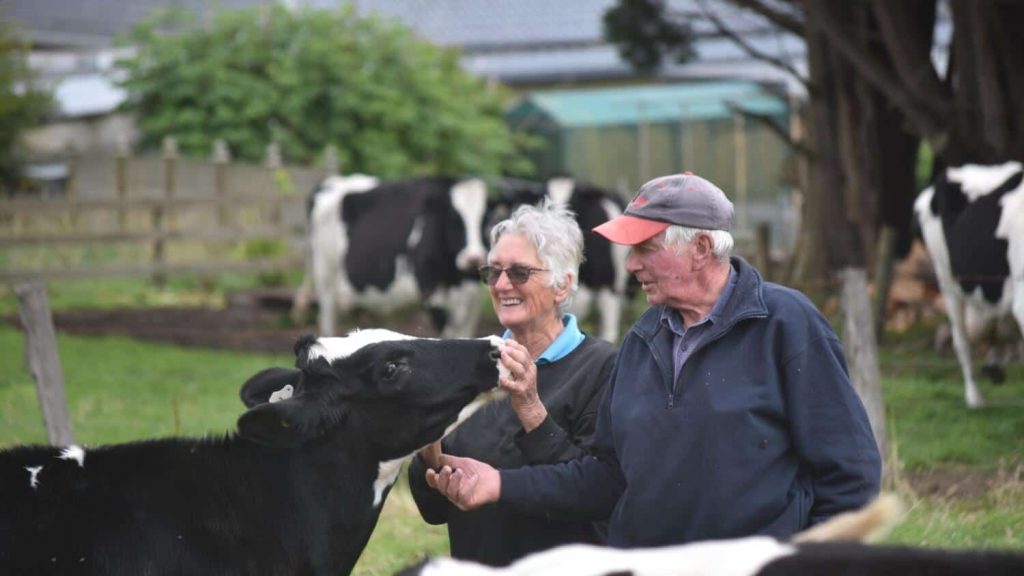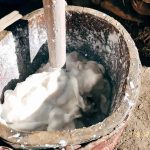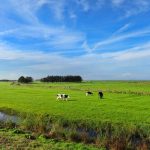
While Elvis was referring to the southern parts of the United States, Daryl and Val’s beloved Dixie is south of Terang.
Daryl has lived there all his life, Val moved from nearby Ecklin, and at 78 and 76, they’ll never leave, even when retirement eventually comes.
Although he worked as a printer’s devil and linotype operator in Terang and later Camperdown, Daryl’s heart was always in Dixie.
His parents raised five boys while milking just 45 cows. Daryl’s older siblings had moved on to other jobs but his younger brother, Lyle, worked on the farm until his tragic death in a car accident.
Daryl continued working for the Terang Express and Val at the BP service station, but they’d be there morning and night to milk, just around the corner from their current home farm.
They started sharefarming around 1968, rented from 1970, bought the cows and then bought the farm in 1973.
It was originally 72ha — now they have about 364ha and milk 270 Holsteins, and also run a small beef herd.
“As kids we were always told ‘put your money into land or bricks and mortar’ so we took opportunities as they came up,” Daryl said.
After 55 years, Daryl and Val have seen a lot of change — but some things still remain the same.
“When we started, we had old crossbred cows and a walk-though dairy before getting a new herringbone,” Daryl said.
“All you had in those days was an old grey Fergie with a carry-all and you made little square bales of hay. You wouldn’t milk the number of cows today if you still had those.
“Round bales were better than stacking little square bales in the shed in stinking hot weather, and decent tractors with cabins were a good addition.”
Occupational health and safety rules have also developed. Back in the day, Daryl had to drive his old tractor through a drain and it would rear-up.
“I’d get Val to sit on the front and hang on to the headlights to keep it down,” he laughed. “OH&S wasn’t heard of in those days.”
Val is only a small woman but she had some help at the time — she was pregnant so that added a bit of weight.
Like many older farmers, Daryl recalls the invaluable advice of Department of Agriculture dairy husbandry officer Jack Green.
“You talk to the old blokes and they’ll swear by Jack and his discussion groups,” he said.
“He worked on the basics. He’d suggest the right bulls, tell the young blokes they didn’t need a dairy with all the bells and whistles.
“He had a lot of sayings. One I remember is ‘the money you borrow in the good times, still has to be paid back in the bad times’.”
While giving back to their community through CFA, hall committee, UDV, school council and various artificial insemination bodies, Daryl and Val have also provided a training ground for many young people.
“I don’t know how many kids we’ve trained and helped to get through uni or buy a car,” Val said.
Today they don’t have any permanent staff, just milkers to help in the evening and relief so they can take an annual holiday.
“We’re still hands-on; I don’t milk but I do everything else,” Daryl said. Val milks mornings, though she admits it’s getting harder.
The main thing that keeps them interested is the love of the land — especially their view towards Mount Noorat — and the animals.
“The cows are like our kids; they’re family,” Val said.
“One staff member from New Zealand said it was the first herd she’d ever walked through without fear of being kicked. She said they’re just a marvellous lot of cows to milk.
“We don’t know the difference because we’ve never milked anyone else’s cows.”
Jack Green used to say the farmer dictates the temperament of the animals and Daryl and Val have always bred for a calm temperament and good udders.
“We wanted cows you could get along with,” Daryl said.
“You just have to call them and they come; they trust us,” Val added.
They remain ‘old school’ when it comes to calving which is once a year, starting in June, with cows drying off from April 23.
They are all AI-bred, the system they’ve used since 1969, and they are keen progeny testers. Photos of their herd have been used many times over the years on promotional brochures.
There are as many photos of cows on the walls as people. Pride of place goes to the progeny of Medallion from the Horizon Progeny Test Program that found fame around the world.
Their cows produce between 32 and 35 litres at their peak, the farm rarely misses an annual milk quality award and they also have two Genetics Australia Golden Cow awards.
Not much rankles Daryl, but animal liberationists complaining about dairy farmers get him fired up.
“One of the most annoying things is the animal libbers who claim dairy farmers are cruel,” he said.
“They should go out on a farm and come around with us at 10 o’clock at night when they’re calving and we want to make sure everything is all right.
“We treat our animals better than we treat ourselves. If you walk out in the paddock and they see you as a friend and walk up and want to lick you, where’s the cruelty?”
With a focus on keeping things simple, Daryl says cows haven’t changed; farmers have, and along the way they’ve bred a better cow.
“When we first started, I was secretary of the Ecklin Herd Test Association,” Daryl said.
“A top herd in those days averaged 13.5 litres at their peak; if they did that these days, they’d be out the door.
“Genetics has been the difference and now we’ve got better cows. They used to have hairy udders or udders that almost dragged on the ground.”
Advances in health and feed have also helped to develop more profitable cows.
“When I was a kid, if a cow had milk fever there was no such thing as a calcium injection. Bloat used to be a problem if you had too much clover in a paddock, but now we’ve got additives to put in the feed for everything.”
While they love Dixie, the area has been threatened by fire several times.
Daryl has been a CFA volunteer for more than 60 years and remains active as a first lieutenant.
He recalls close calls while battling the Ash Wednesday fires of 1983 and St Patrick’s Day fires of 2018.
For many years, the Dixie fire truck was housed at their farm. On bad fire nights the property on a hill with an expansive view becomes a beacon for other local residents.
“Back when I started, things were simple,” Daryl said.
“Everyone was in the fire brigade. Farmers had to band together to protect their properties. Today with a lot of corporate farms, you’ve lost that sense of community.”
Although they have no plans to sell at this stage, Daryl admits “the hills are getting steeper”.
“I try to discuss retirement but he won’t listen,” Val said.
Their son is a politician in Queensland and has no interest in the farm but their daughter and her husband are keen to take over the family farm when Daryl is ready to take a step back.
“We’ve got to live in Dixie. Dixie has been our life,” Val said.
“People say why don’t you shift to Warrnambool. Why would I want to go to Warrnambool? All my friends are here.”
Dixie is home to Daryl and Val Crawford and they don’t plan to give up their hilltop views.

























